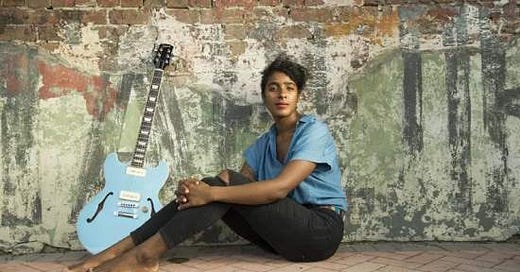The Capitalist Blues
Leyla McCalla's lyrical rebuke of the emotional, psychological, socioeconomic and environmental costs visited upon the commons by late capitalism.
Weaving together elements of Cajun, zydeco, jazz, R&B and Leyla McCalla’s own Haitian American heritage, conditioned by a decade of living in New Orleans, The Capitalist Blues (Jazz Village) is a departure from her solo acoustic outings, as well as her work with The Carolina Chocolate Drops and Our Native Daughters. McCalla enlists some of the Big Easy’s outstanding players (banjo, guitar, lap steel, fiddle, viola, bass, piano, accordion, clarinet, sax, trumpet, trombone, tuba, glockenspiel, drums, percussion) and concentrates primarily on her singing. Her music is straightforward, concrete, and unadorned, yet seasoned with tenderness and a trace of whimsy conveying the palpable joy that she took in working with her collaborators.
This, her third release, is a lyrical rebuke of the emotional, psychological, socioeconomic and environmental costs visited upon the commons by late capitalism. McCalla observes, “These songs are my reflection on motherhood, womanhood, activism and spirit…. seeing more clearly the cost to humanity of in placing value in capital over human life.” The songs “reflect my experience living in a capitalist society, where we are always expected to do more, be more, and have more…. I also find myself questioning the myriad inequities of the world that we live in.”
With the opener, fittingly recorded at Preservation Hall, McCalla sets the tone with a bluesy, brassy, down-and-dirty New Orleans lament:
You keep telling me to climb this ladder
I’ve got to pay my dues
But as I rise, the stakes get higher
I’ve got the capitalist blues
And if I give everything
I won’t have much more to lose
Following in keen counterpoint is the only non-McCalla number, Trinidadian calypsonian Neville “Growling Tiger” Marcano’s classic “Money Is King” (recorded originally by Alan Lomax in the 1930s). In the debased context of contemporary politics, hers is a critical and timely reinterpretation:
If a man has money today…
He can commit murder and get off free
Live in the Governor’s company
But if you are poor
People will tell you “Shoo!”
A dog is better than you
McCalla speaks truth to the wages of inequality with “Heavy as Lead,” questioning the policies that have degraded essential infrastructure and poisoned poor communities in particular. Likewise, “Mize Pa Dous,” sung in Haitian Kreyol, observes, “Poverty isn’t sweet/ It wears me out… Poverty isn’t sweet/ It makes me ashamed… An expensive life is one of poverty.”
McCalla extends her critique beyond the domestic realm with “Aleppo,” a fuzz-tone scorcher stirred by viewing the last videos posted to Facebook by Syrian civilians helplessly awaiting their almost certain annihilation: “Bombs are falling in the name of peace… We won’t know their names/ Their faces unknown…”
There are upbeat moments too, as with “Oh My Love,” a tender reflection on the capricious flux of domestic life: “Our moments of perfection are so fleeting/ But when we get things right/ That’s what keeps my heart beating.” Similarly, on “Me and My Baby,” McCalla sings with affection, “Down by the river/ I see my baby smiling… And in the evening/ I hear my heart is singing.”
To close, unleashing the unruly essence of Haitian carnival music, Haitian roots ensemble Lakou Mizik joins McCalla on a rara-tinged “Settle Down,” wherein vaccine (Haitian single-note trumpets) and tanbou (Haitian barrel drums) punctuate the song’s reflection upon the controversy that arose when New Orleans officials ordered the city’s Confederate monuments to be removed. Forged in challenging times, The Capitalist Blues is a textured, timely, and evocative release.





Hey Michael, we are very much enjoying your suggestions and mixed lists of the origins of jazz.
Also very much looking forward to your hopefully new Christmas playlist. we still play the old one but were ready to be surprised. Hey to Gabby! Be well and glad tidings. Dennis & Marianne